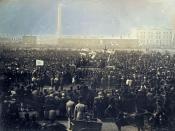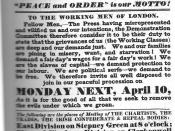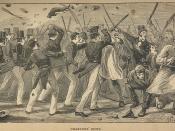Chartism was the name of a variety of protest movements in England during the 1830s and 1840s, which aimed to bring about change in social and economic conditions through political reform. Its name comes from the People's Charter, a six-point petition presented to the House of Commons with the hope of having it made law. As described in Document 1, the six points included annual parliaments, universal manhood suffrage, and abolition of the property qualification for members of the House of Commons, the secret ballot, equal electoral districts, and salaries for members of Parliament. Yet, historians question whether the Chartist Movement had any revolutionary ideals because of their eagerness to gain full political rights for solely the working-class. Since Chartism was considered for the working men rather than the whole society, it made little changes in political and social issues. Chartism's lack of success was due to a fundamental lack of focus, it was supported by a wide range of people with differing motives, hopes, and fears.
When the Reform Bill of 1832 was enacted, working men were unsatisfied because it enfranchised only the middle class, and not the working and lower classes. As a result, the London Working Men Associations started developing. The Factory Act of 1832 was enacted reducing work hours for children, but not for adults. Also, the passing of the Poor Law of 1834 became controversial, sparking further Chartist and working class upheaval. Poor law entailed the abolishment of outdoor relief, and relief was only to be given to the poor in the workhouses. The conditions in these workhouses were made to be worse than the lowest paid laborers and families that entered the workhouse would be split in accordance with rules of separation; indirectly, discouraging people from seeking help. Another reason for general discontent...


